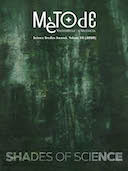Digital futures: A brief essay on sustainable life in the digital age
DOI:
https://doi.org/10.7203/metode.10.12539Keywords:
digital age, sustainable living, misinformation, surveillance, thinking Abstract
Abstract
The following reflections are based on the premise that individual and social life is open not only to a single goal, in a deterministic historical process, but rather, to a number of possibilities, among which we can find digitalisation. Society, understood as interaction among free citizens and between them and their government, must now promote everyone’s participation in the creation of potential digital futures. These must be based on fair rules and also promote digital literacy both in the sense of educating citizens in the management of digital technologies and in giving them the tools to reflect critically upon them in relation to sustainable lifestyles.
 Downloads
Downloads
 References
References
Aristotle. (1924). Metaphysics. W. D. Ross (Ed.). Oxford: Clarendon Press.
Capurro, R. (2008). On Floridi’s metaphysical foundation of information ecology. Ethics and Information Technology, 20(2–3), 167–173. Retrieved from http://www.capurro.de/floridi.html
Capurro, R. (2014). La libertad en la era digital. Informatio. Revista del Instituto de Información de la Facultad de Información y Comunicación, 19(2), 5–23. Retrieved from http://informatio.eubca.edu.uy/ojs/index.php/Infor/index
Capurro, R. (2017a). Autonomous zombies are not an option. 2025 AD. The Automatic Driving Community. Retrieved from https://www.2025ad.com/latest/rafael-capurro-driverless-cars/
Capurro, R. (2017b). ¿Quiénes somos en la era digital? Bibliotecas. Anales de Investigación, 13(2), 231–234. Retrieved from http://revistas.bnjm.cu/index.php/anales/issue/view/270/showToc
Capurro, R., Eldred, M., & Nagel, D. (2013). Digital whoness. Identity, privacy and freedom in the cyberworld. Berlin: De Gruyter.
Castells, M., & Himanen, P. (2014). Reconceptualizing development in the global information age. Oxford: Oxford University Press.
European Commission. (2018). Communication artificial intelligence for Europe. Retrieved from https://ec.europa.eu/digital-single-market/en/news/communication-artificial-intelligence-europe
Froehlich, T. J. (2017). A not-so-brief account of current information ethics: The ethics of ignorance, missing information, misinformation, disinformation and other forms of deception or incompetence. BiD: Textos Universitaris de Biblioteconomia i Documentació, 39. doi: 10.1344/BiD2017.39.8
Kant, I. (1975). Beantwortung der Frage: Was ist Aufklärung? En Schriften zur Anthropologie, Geschichtsphilosophie, Politik und Pädagogik (pp. 53–61). Darmstadt: Wissenschaftliche Buchgesellschaft.
Limberg, L., Sundin, O., & Talja, S. (2012). Three theoretical perspectives on information literacy. Human IT, 11(2), 93–130. Retrieved from https://humanit.hb.se/article/view/69/51
Marx, K. (1969). Thesen über Feuerbach. Marx-Engels Werke, 3. Berlin: Dietz. Retrieved from http://www.mlwerke.de/me/me03/me03_005.htm
Morozov, E. (2013). To save everything, click here: The folly of technological solutionism. New York: Public Affairs.
Seyfert, R., & Roberge, J. (Eds.). (2016). Algorithmic cultures: Essays on meaning, performance and new technologies. London/New York: Routledge.
Zuboff, S. (2019). The age of surveillance capitalism: The fight for a human future at the new frontier of power. New York: Public Affairs.
Downloads
Published
How to Cite
-
Abstract2059
-
PDF968
Issue
Section
License
![]()
All the documents in the OJS platform are open access and property of their respective authors.
Authors publishing in the journal agree to the following terms:
- Authors keep the rights and guarantee Metode Science Studies Journal the right to be the first publication of the document, licensed under a Creative Commons Attribution-NonCommercial-NoDerivatives 4.0 International License that allows others to share the work with an acknowledgement of authorship and publication in the journal.
- Authors are allowed and encouraged to spread their work through electronic means using personal or institutional websites (institutional open archives, personal websites or professional and academic networks profiles) once the text has been published.





